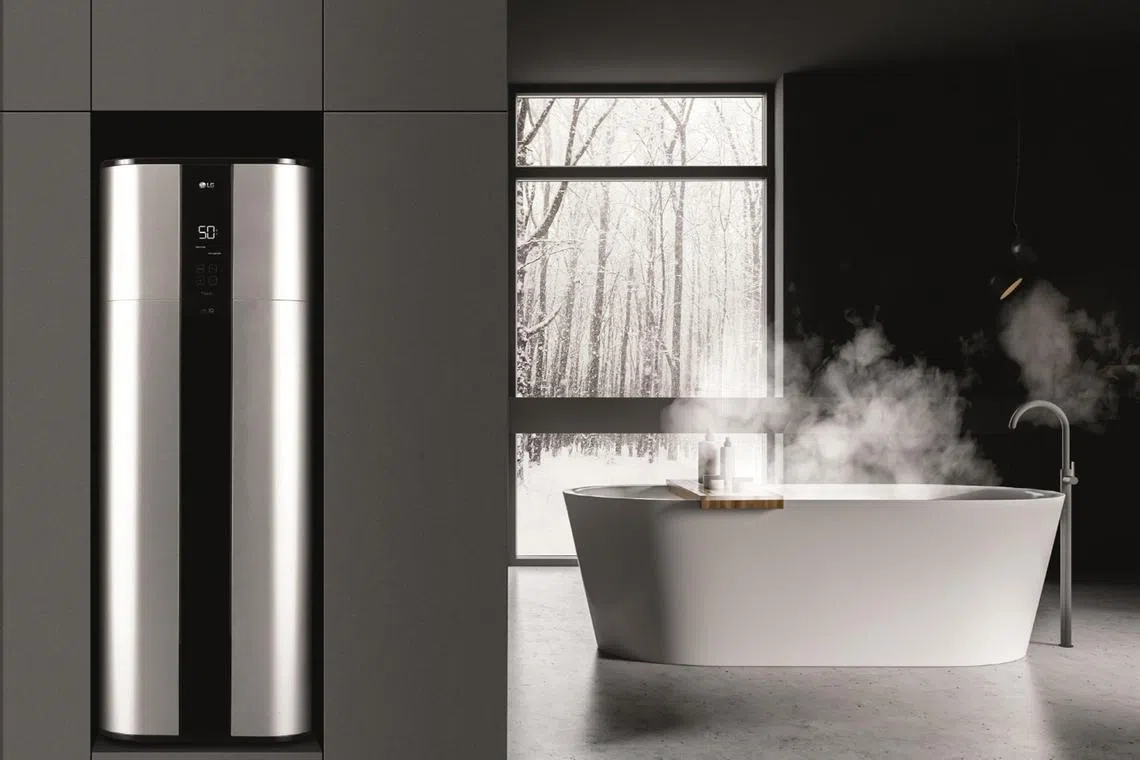Heat-pump appliances look set to take off
Sign up now: Get ST's newsletters delivered to your inbox

Heat pumps use electricity to transfer heat from outside (air, ground or water) via a refrigerant into the home.
PHOTO: LG ELECTRONICS
Follow topic:
A career installing heat pumps, which are efficient home-heating contraptions, looks like a sure thing now. Installers have months-long order backlogs and lack qualified staff, while manufacturers see heat pumps as a potential gold mine; even Mr Elon Musk’s Tesla has talked about joining the fray.
Heat pumps use electricity to transfer heat from outside (air, ground or water) via a refrigerant into the home. They are flying off warehouse shelves on both sides of the Atlantic as governments ban new gas and oil systems, set ambitious installation targets, and offer generous incentives to boost adoption.
Although more expensive than installing a gas boiler, heat pumps can lower monthly energy bills and carbon pollution.
“It’s literally a once-in-a-generation opportunity,” said Carrier Global’s chief executive David Gitlin when announcing a €12 billion (S$17 billion) takeover of German rival Viessmann Group’s heat-pump business.
European governments are “basically forcing you to transition from legacy fossil-fuel boilers to heat pumps, and you’re going to be charging about up to four times the price for that replacement”, he said.
Heat-pump manufacturers are enjoying high profit margins as demand outstrips their ability to deliver, but a global race is under way to add factory capacity, and companies are pursuing takeovers to achieve economies of scale.
The “technology itself is not sophisticated” and the attractiveness of the European market “isn’t lost on the competition”, said Mr Phil Buller, who analyses industrial companies.
A price war has kicked off in Britain and, in the longer term, there is a risk that European heat-pump manufacturers will meet a fate similar to that of solar companies, which were displaced by lower-priced Chinese imports.
Consumers should welcome this jostling for market share, because shortages of labour and components have tended to push up the already high cost of heat-pump installations; lower prices are needed to spur greater adoption and maintain public support for the energy transition.
For now, investors are not too worried and have bid up the shares of the small number of publicly traded companies in this sector. Swedish heat-pump manufacturer Nibe Industrier has gained around 1,700 per cent, including dividends reinvested, in the past decade. The stock trades on more than 40 times estimated earnings, around three times dearer than the Stoxx Europe 600 benchmark index.
Nibe’s management sounded confident after announcing bumper first-quarter earnings this past week. Heat-pump sales increased more than 40 per cent year on year, while price increases contributed to a widening of the climate division’s operating profit margin to 17.5 per cent.
Other European manufacturers are also putting up a fight: Privately owned Stiebel Eltron, Vaillant Group and Robert Bosch have announced big factory investments in Europe to capitalise on their golden ticket. The trouble is, so have Japanese giants Daikin Industries, Mitsubishi Electric and Panasonic, as well as China’s Midea Group.
Heat pumps are technologically similar to air-conditioners, which Asian companies have been mass-producing for decades. Asian companies (and their overseas subsidiaries) manufactured 75 per cent of the heat pumps sold globally in 2021, according to the International Energy Agency.
European companies do have some defensive advantages. The importance of local knowledge and equipment tailored to a country’s unique heating and building characteristics should offer a bigger edge to domestic businesses than others in the solar industry, said Mr Matthew Trewhella, CEO of British ground-source heat-pump manufacturer Kensa Group.
European homes will often require hydronic systems – water-based distribution mediums like radiators – rather than the forced-air systems more common in other parts of the world. That may support a “slightly more regional market for heat pumps than for other clean energy industries”, said Ms Meredith Annex, head of clean power at BloombergNEF.
Home owners may prefer to purchase a higher-priced German system, rather than cheaper Chinese kit, on the basis that their property might then be worth more when they sell it.
And while the technology itself might not be difficult to master, you still need someone to install it: Carrier has said Viessmann’s close connection to tens of thousands of technicians who favour its products creates a defensible “moat”. However, Carrier investors do not seem convinced: Its shares have declined more than 5 per cent since news of the deal emerged. BLOOMBERG

